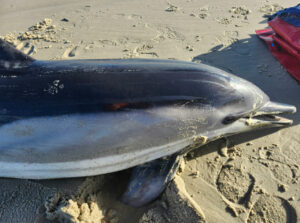PROVINCETOWN – The Massachusetts Department of Public Health (MDPH) announced today (September 21, 2023) that the Eastern Equine Encephalitis (EEE) virus has been detected in a mosquito sample collected from Provincetown.
EEE is a rare but serious illness spread by the bite of an infected mosquito. While EEE can infect people of all ages, people under 15 years of age or over 50 years of age are at greatest risk for serious illness.
The type of mosquitoes trapped in Provincetown were Culiseta melanura, a bird-biting species that plays a role in EEE transmission/amplification in the bird population. With this sample coming from a bird-biting type of mosquito, the risk to humans is quite low but not non-existent. Additional samples were collected today, with results expected by Tuesday, September 26.
As a result of these findings, the local EEE risk level has been raised from ‘Remote’ to ‘Low’. Surveillance is ongoing and mosquito testing will continue into October.
The Cape Cod Mosquito Control Project will have additional crews out tomorrow checking and treating any standing water in wetland areas and catch basins, as well as any containers holding water.
By taking a few, common-sense precautions, people can help to protect themselves and their loved ones:
- Avoid Mosquito Bites:
- The public is reminded to use EPA registered repellents when you go outdoors. Use a repellent with DEET (N, N-diethyl-m-toluamide), permethrin, picaridin (KBR 3023), IR3535 or oil of lemon eucalyptus [p-methane 3, 8-diol (PMD)] according to the instructions on the product label. DEET products should not be used on infants under two months of age and should be used in concentrations of 30% or less on older children. Oil of lemon eucalyptus should not be used on children under three years of age. Permethrin products are intended for use on items such as clothing, shoes, bed nets and camping gear and should not be applied to skin.
- Be Aware of Peak Mosquito Hours – The hours from dusk to dawn are peak biting times for many mosquitoes. Consider rescheduling outdoor activities that occur during evening or early morning. If you are outdoors at any time and notice mosquitoes around you, take steps to avoid being bitten by moving indoors, covering up and/or wearing repellant.
- Clothing Can Help reduce mosquito bites. Although it may be difficult to do when it’s hot, wearing long-sleeves, long pants and socks when outdoors will help keep mosquitoes away from your skin.
- Mosquito-Proof Your Home
- Drain Standing Water – Many mosquitoes lay their eggs in standing water. Limit the number of places around your home for mosquitoes to breed by draining items that hold water. Check rain gutters and drains. Empty unused flowerpots and wading pools and change water in birdbaths.
- Install or Repair Screens – Some mosquitoes like to come indoors. Keep them outside by having tightly-fitting screens on all your windows and doors.
The state website containing these findings and recommendations can be found at https://www.mass.gov/info-details/massachusetts-arbovirus-update.
More information and fact sheets are available at www.mass.gov/dph/mosquito.
























